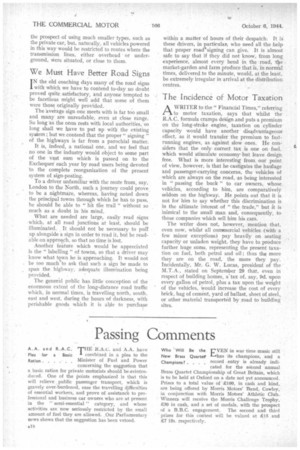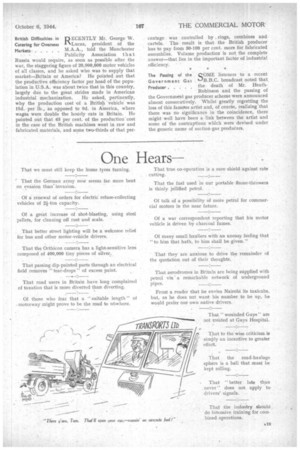Passing Comments
Page 20

Page 21

If you've noticed an error in this article please click here to report it so we can fix it.
A.A. and R.A.C. 'THE R.A.C. and A.A. have Plea for a Basic I combined in a plea to the
Ration Minister of Fuel and Power concerning the suggestion that a basic ration for private motorists should be ireintroduced. One of the points emphasized is that this will relieve public passenger transport, which is gravely over-burdened, ease the travelling difficulties of essential workers, and prove of assistance to professional and business car owners who are at present in the " semi-essential " category, and whose activities are now seriously restricted by the small amount of fuel they are allowed. Our Parliamentary news shows that the suggestion has been vetoed.
/AS
EVEN in war time music still 1-4has its champions, and a record entry is already indicated for the second annual Brass Quartet Championship of Great Britain, which is to. be held at Oxford on a date not yet announced. Prizes to a total value of £100, in cash and kind, are being offered by Morris Motors' Band, Cowley, in conjunction with Morris Motors' Athletic Club. Winners will receive the Morris Challenge Trophy, £30 in cash, and a set of medals, with the prospect of a B.B.C. engagement. The second and third prizes for this contest will be valued at £15 and :£7 10s. respectively. Who Will Be the New Brass Quartet'
Champions ? . . .
RECENTLY Mr. George W. I‘Lucas, president of the M.A.A., told the Manchester Publicity Association that Russia would require, as soon as possible after the war, the staggering figure of 20,000,000 motor vehicles of all classes, and he asked who was to supply that market—Britain or America? He pointed out that the productive efficiency factor per head of the population in U.S.A. was about twice that in this country, largely due to the great strides made in American industrial mechanization. He asked, pertinently, why the production cost of a British vehiclewas 15d. per lb., as opposed to 9d. in America, where wages were double the hourly rate in Britain. He pointed out that 65 per cent, of the production cost in the case of the British machines went in raw and fabricated materials, and some two-thirds of that per
British Difficulties in Catering for Overseas Markets
centage was controlled by . rings, combines and cartels. The result is that the British producer has to pay from 30-100 per cent. more for fabricated assemblies. Volume production is not the complete answer—that lies in the important factor of industrial efficiency.
The Passing of the Government Gas Producer
SOME listeners to a recent B.B.C. broadcast noted that the death of Mr. HeathRobinson and the passing of the Government gas producer scheme were announced almost consecutively. Whilst greatly regretting the loss of this famous artist and, of course, realizing'that there was no significance in the coincidence, there might well have been a link between the artist and some of the contraptions which were devised under the generic name of suction-gas producers.




















































